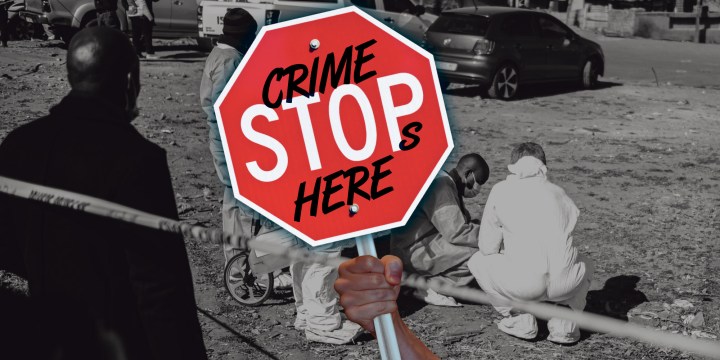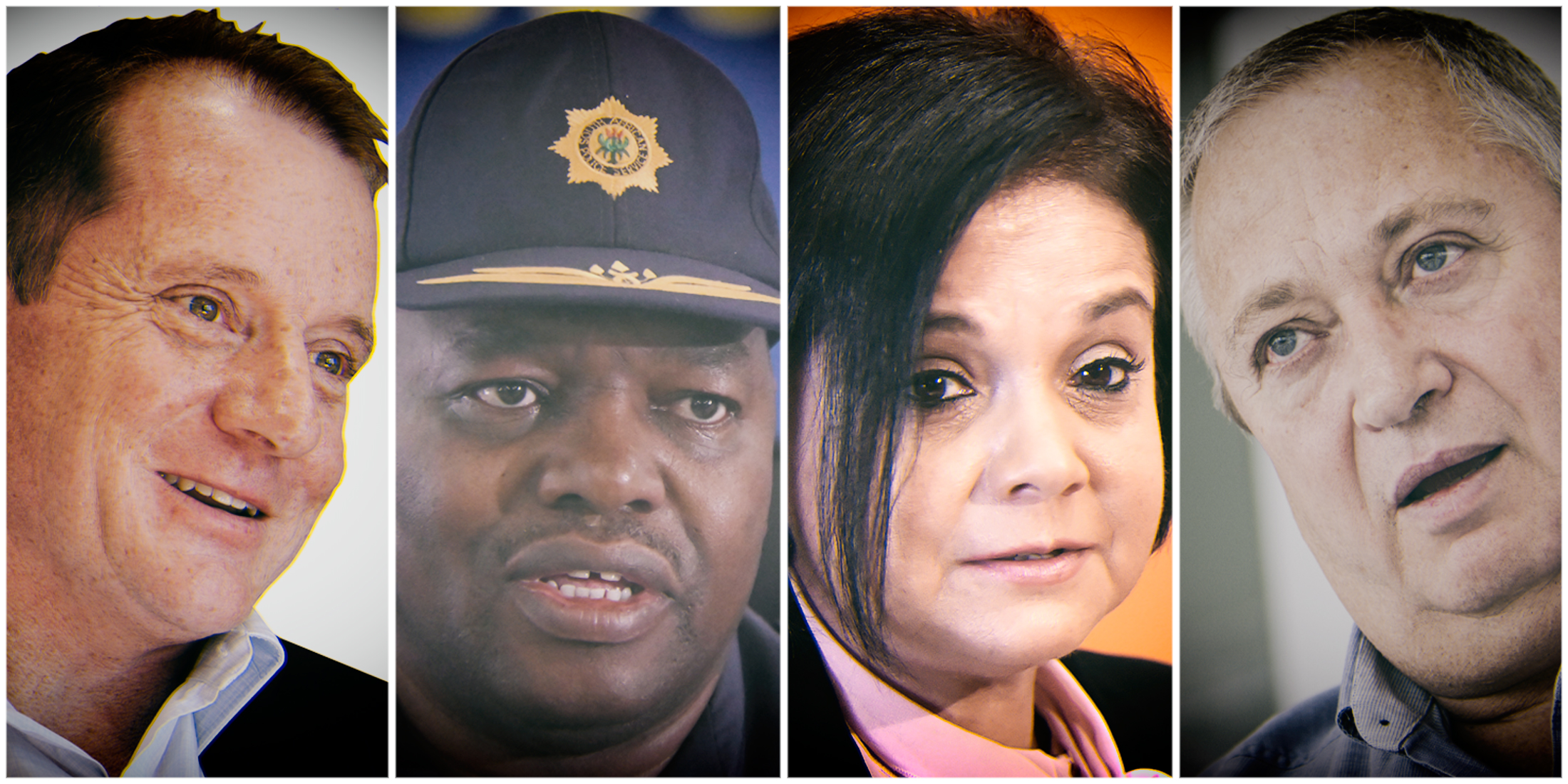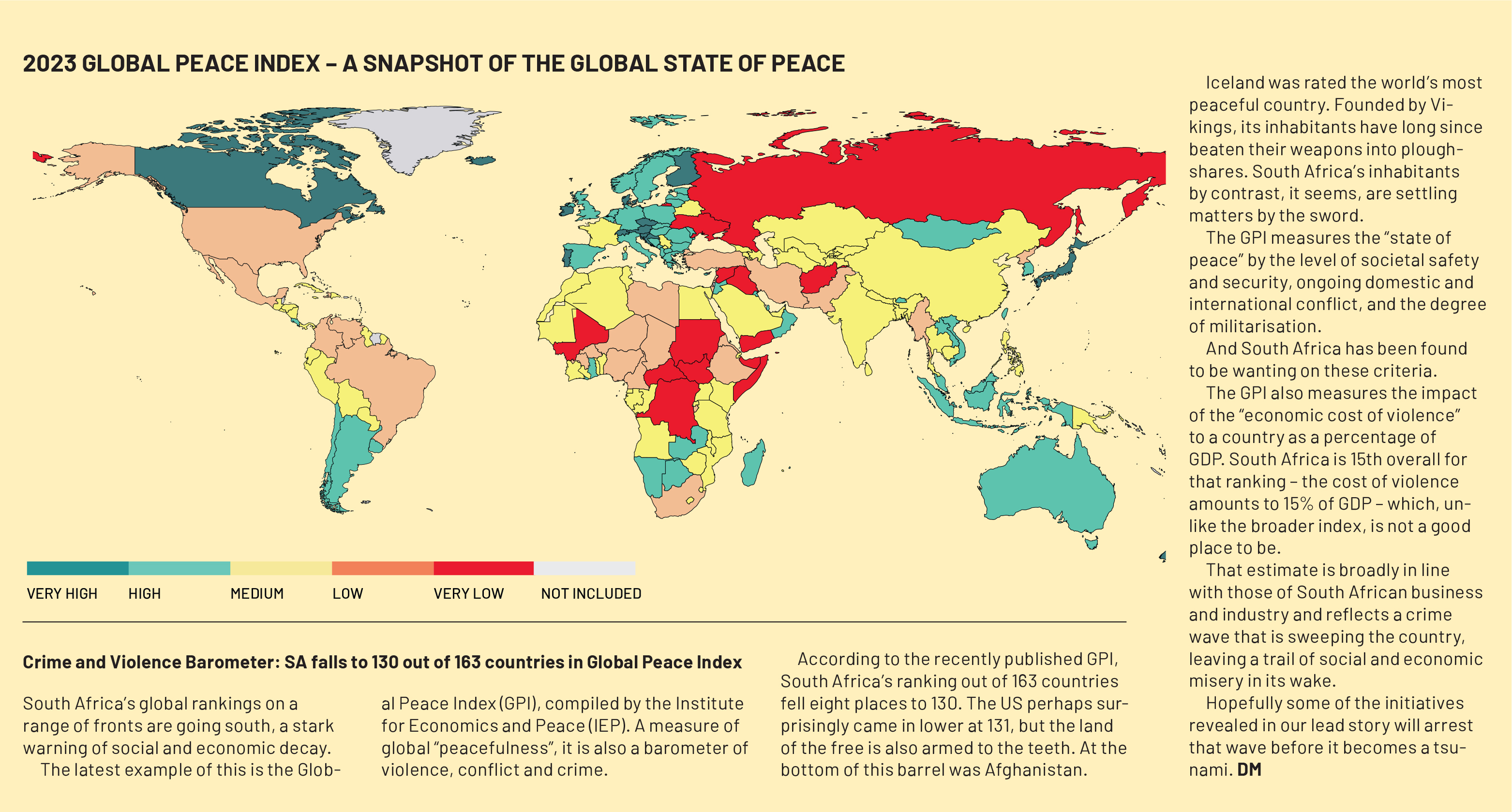OPERATION FIX SA
Business and government’s master plan to rid South Africa of its R1-trillion crime and corruption headache

The South African business sector, in partnership with government, will build a forensics lab, strengthen the National Prosecuting Authority and pool intelligence, among other initiatives, to disrupt syndicates and mafias.
Business and government agreed in June to partner on workstreams to target a trifecta of woes undermining South Africa’s economic potential: energy, transport, and crime and corruption.
Neal Froneman, CEO of diversified miner Sibanye-Stillwater, is leading the crime and corruption initiative on behalf of business, along with Remgro CEO Jannie Durand.
In an interview with Daily Maverick, Froneman revealed some of the measures that business is taking to tackle a scourge that he said was costing the economy up to R1-trillion annually.
“Ensuring there’s capacity within the National Prosecuting Authority (NPA), the specialised skills it needs, is one of the workstreams we are working on. And that does have the support of the minister of justice and we have the appropriate MOUs [memorandums of understanding] in place with the NPA,” Froneman said.
“We also intend as business to build a state-of-the-art forensics laboratory that should assist the NPA conducting its work. And, of course, a lot of forensics work now is using AI and data analysis, and smart computers to track these illicit flows. That’s one workstream to capacitate these organisations to perform and deliver.”
The location of such a lab and cost estimates are still being worked out, but this could be a potential game-changer as the woeful state of South Africa’s forensics capabilities has been a thorn in the side of law enforcement. The main laboratory is in Pretoria, and others are in Cape Town, Durban and Gqeberha.
Public Service Commission commissioner Anele Gxoyiya expressed his concerns about the state of forensic science laboratories in late June. He noted that backlogs meant the facilities “cannot fulfil their critical role effectively and are therefore contributing to delays in the criminal justice system”.
Froneman also said various business sectors would pool their intelligence-gathering resources to provide the authorities with the spoor to track down criminal syndicates.
“The other area is giving Business Against Crime South Africa some real horsepower,” he said, referring to the division of Business Leadership South Africa that focuses on this issue.
“Each industry has got its own organisation,” Froneman said. Examples include South Africa’s Minerals Council, which represents the mining sector, and the Banking Association, which represents the banks.
“All of these organisations have good crime and corruption capacity for their own industry. But it’s been very disjointed. Business Against Crime is going to coordinate all that intelligence and information better, and we are going to use that to disrupt these illicit supply chains.”
Froneman said he could not disclose precise details because that would in effect be a tip-off to the criminals.
“I can’t say exactly how we are going to use it because, if we do that, we will be neutralised. But let’s just say that we know how to disrupt these supply chains. And once we have got information, we will take it to the appropriate authorities.
“But we are not going to rely on somebody else to make a move. And we are going to be very active in disrupting these mafias and supply chains. What used to be Business Against Crime monitoring screens and dealing with petty theft is going to change focus to dealing with syndicated and organised crime,” Froneman said.
“It’s using all the intelligence across business networks and then using business itself to disrupt these illegal activities and then passing on the intelligence in parallel to the prosecuting authorities.”

From left: Remgro CEO Jannie Durand. (Photo: Gallo Images / Foto24 / Denzil Maregele) | National Police Commissioner Fannie Masemola. (Photo: Gallo Images / Beeld / Deaan Vivier) | National Director of Public Prosecutions at the National Prosecuting Authority Shamila Batohi. (Photo: Gallo Images / Phill Magakoe) | Neal Froneman, CEO of diversified miner Sibanye-Stillwater. (Photo: Waldo Swiegers / Bloomberg via Getty Images)
Call centres and cop shops
Froneman also stressed that business was not trying to assume the role of the state or undermine the independence of the police or prosecuting authorities.
“I don’t want to create an impression that we are going to do the police’s job. What business is able to do is to provide assistance and capacity to organisations like the NPA. Now, clearly that’s got to be done in a way that does not negatively impact their independence. Another workstream is ensuring the independence of these prosecuting authorities and that they remain independent. We are going to work to ensure their independence,” he said.
A source familiar with the government’s approach to the matter confirmed this was the case and said the MOUs in place addressed the issue of independence. A Chinese wall on this front is important because there are certainly factions in the governing ANC that are suspicious of business.
So, for example, if a lab is built, business is not going to try to dictate what cases should be subjected to forensic analysis.
In a joint statement on 8 June, when the initiative was announced, government and business explained how this would work.
“Business will provide support, on a carefully governed arm’s-length basis, to combat crime and corruption, in particular – expert resources to further capacitate the NPA and the ID [Investigative Directorate].”
Other initiatives involve call centres and cop shops, said Froneman. “This is a joint initiative with government and, together with government, they’ve identified a number of issues they would like us to work on.
“One is as simple as ensuring this 10111 call centre works properly and is modernised. The other one is improving the performance of police stations.
“This is where you can make a sustainable difference by looking at training, capacity, and so on. And business has significant resources to also ensure that it is done in the right way. We are not going to train policemen as business, but we can ensure that, together with government, there are proper programmes put in place. We can use our business strategic planning and project management to make these type of things happen,” Froneman said.
Economic costs
There is broad agreement that crime and corruption are a huge cost to the South African economy, which is why the issue has been identified as a priority in this partnership between government and business.
Estimates of their cost to the economy range widely because it is difficult to pin down a precise number, not least because of the ripple effects such as thwarted investment and lost production.
Froneman said the estimates that have emerged within the workstream are massive and material. “As you participate in this workstream, you become aware of how bad things really are. Crime costs the country somewhere between R500-billion and R1-trillion annually. That is equivalent to between 10% and 20% of GDP. It’s really, really material and that is direct costs.
“But it impacts on foreign investment; it impacts on investor sentiment. The knock-on effects are much bigger,” Froneman said.
Business Leadership South Africa spokesperson Tumelo Muteme said in response to Daily Maverick’s query on the matter that “it is very difficult to give an accurate number”, but that the organisation agreed with Froneman’s estimate.
One organisation that has come up with an estimate is the Institute for Economics & Peace, which recently published its Global Peace Index.
Among other things, it looks at the “economic cost of violence” to a country as a percentage of GDP.
For 2022, it ranked South Africa 15th overall out of 163 countries in terms of the size of the cost as a percentage of GDP. Its estimate for South Africa was 15%.
“The illicit copper industry alone exceeds R40-billion annually,” Froneman said. “These are big numbers. This is copper cable theft, and copper taken from transformers and resold.
“And the loss to a company like ourselves [Sibanye-Stillwater] is even bigger where we have operational disruptions not included in that number – that’s just the illicit supply chain.”
Sibanye said in March that it lost more than R1-billion in production last year as a result of copper cable theft. Such costs ultimately mean there is less capital available for investments that create jobs and economic opportunities.
“Our focus is on anything that harms the legitimate economy and the wellbeing of the country. If you improve the economy, you reduce unemployment and, if you do that, you are contributing to uplifting people. It’s not a selfish business interest.” DM
Additional reporting by Ray Mahlaka.
This story first appeared in our weekly Daily Maverick 168 newspaper, which is available countrywide for R29.




















I think an initiative like this is a good start. However, I think the absence of citizen-based observers is a real weakness. Minimally, there should be clear reporting requirements so that the general public can independently assess the effectiveness of this program.
There are so many things I would like to point out right now, but in the interests of keeping what is a desperately needed and incredibly welcome initiative in the constructive light it deserves I consider it prudent to bite my tongue.
I’ll do the same except that the flock are getting into bed with the wolves. Ramaphosa was elected on the promise of cleaning up corruption but it is all pervasive from top to bottom. It’s definitely no better than when he took over.
Whilst I admire this initiative, it is yet another example of the private sector doing the government’s job. So the government can continue to do fokol and use our tax money to employ more useless cadres! Where does it end?
Since crime and corruption issues from the top and down throughout the whole system, it will take a whole lot more than a forensics lab. Perhaps a nice try but beating around the bush is just more blah blah woof woof…
I agree, propping up a failed government just before an election appears counter productive. In some cases the alignment of business and independent institutions is problematic.
I read this article with an overwhelming sense that Trumpian alternative- reality has well and truly taken hold in South Africa.
So this government is being engaged to fight against corruption ?
I suggest that that this piece be above be submitted for the next instalment of the Monty Python show
You are so right Alley Cat….but perhaps this is the price we are having to pay for Apartheid…at least that is what we are led to believe! Well, in my opinion, the payback has happened and it’s time to move on. The ANC should be held accountable for their mismanagement which continues thanks to its racist BEE policies, theft from tax and rate payers and abuse of the country’s minority generally.
It’s about time Biz SA stepped in – hopefully it’s not too late.
Calling it “crime and corruption” seems to imply that those are different things. That corruption is somehow different to crime? Surely its all just “crime”?
This is all well and good how do the criminals in the Presidency and parliament feel about this? A great idea that’s going to go nowhere fast
For this initiative to succeed, business needs governments own corruption to be condemned. It starts at the top and that’s where the problem lies.
Brilliant that they are making an effort and starting in the right place.
Something that would make a huge difference is ensuring everything in a docket is securely copied and then have panel of retired judges, magistrates and attorneys review dockets early on to give advice to ensure the investigation focuses and gathers and presents a case that will pass muster and can proceed quickly.
Overseas, most cases are resolved with plea agreements without even starting in court. Strong dockets convince accused and their lawyers if the lawyers are not just interested in long cases and big fees…
This is a great initiative with one proviso. Government committs, preferably in a written agreement, to doing there part where there are measuarble outputs made public and have ongoing management and control. The Government is required to fulfill all the work envisaged in this initiative. It really amounts to offering free to Government help to do the work the taxpayer is already funding. It would be preferable to also get commitment from Government to implementing complimentary action. For example, implementing the requirements of the Glenister judgement, prioritising the Zondo recommend investigations- major political players at the top.
Bring back the Scorpions as well
When the police and judicial system move into the 21st century, maybe in the 22nd century.
This is good news. Though we continue to ask why the government and public service are so inadequate. Corruption and lack of competence – fruits of thirty years of one party in power. Parallel to this initiative by big business is the bill that the DA is putting to Parliament soon, to enable the Western Cape to take on (via the constitution) devolved powers over transport, security, and more.
The negative sentiments are justified, but the status quo can’t prevail. Something has to change and any attempt is so much better than no attempt at all.
It’s a good thing that big business is finally telling government (in not so many words) that they’re absolutely useless at maintaining a working society. My key concern is that it seems that criminal syndicates have politicians and cops in their pockets, whether at a localised level or higher, which is why so few of the criminals involved in organised crime are ever brought to book.
If government is serious about tackling organised crime, start with tackling the truck-burning mafias as CIT gangs (they’re effectively the same) and deploy massive resources against them. Same as the construction mafias. And the wildlife trafficking syndicates. But the battle also needs to go further: without massive job creation, those who remain unemployed and unemployable will always be useful foot soldiers for syndicates; a radical (not leftist) overhaul of SA’s economy is required to unlock investment in mining, manufacturing, agri-industrial value chains, logistics infrastructure, social infrastructure and so much more. However, that would require SOEs and their political masters to do an honest day’s work, rather than syphoning off the cash, which will be incredibly difficult to stop with the current patronage based mob in power.
As a South African, I’m so happy to have a reason for hope. But I am also concerned about business creating artificially good impressions of a failing government so close to a national election. It would almost be better to bear the pain and let things continue to fail for another year, hope the voters are gatvol enough for a change in government, and pledge to help a new government to build back the country thereafter.
Anyone tried calling 10111 recently – I tried for the fire service and couldn’t get through to the correct service – then the next 3 times I called I couldn’t get through at all!
Isn’t this the same government that hates capitalism and dare I say, private industry et al???? Now we have to help (once again) to fix their mess?!?
The private sector remains beholden to the ANC. As long as they sort out the country and continue to give credit to ANC we will sink. I am elated that business (private sector) are stepping in. But the ANC will make sure they stay in their lane. And make them look good for the election. SA biggest dilemma is fixing the country by doing governments job for the sake of citizens and replacing a corrupt ANC.
‘The private sector remains beholden to the ANC’ – dead right! And that’s where half the blame should lie – they’ve rolled over and asked how high they should jump for the last 29 years, when they should have put their collective feet down right from the start when the ANC pushed their destructive cadre deployment policies onto the civil service and private business. They’re finally waking up to the failure of their sycophantic behaviour when it’s almost too late.
Doomed for failure from the start. The first sentence says it all – “in partnership with government”. Is there actually an honest politician?